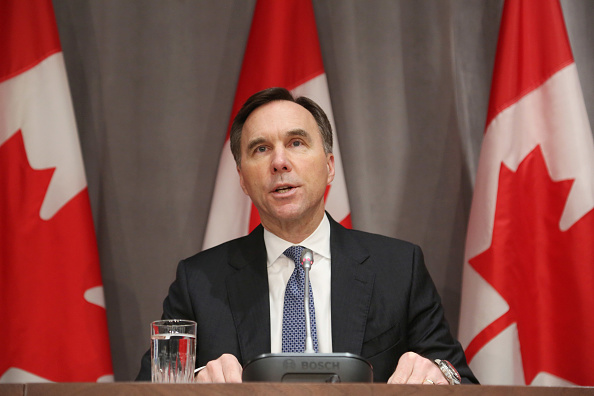
Finance Minister Bill Morneau speaks during a news conference on Parliament Hill March 18, 2020 in Ottawa. (Photo by Dave Chan / AFP via Getty Images)
By
The federal government “probably” overspent on its COVID-19 stimulus payment programs, says former Liberal finance minister Bill Morneau, who also expressed concern about the possibility of a recession hitting Canada this year.
“For this government to be more effective … in managing the economy, it’s about engaging with the provinces to make sure that we create those opportunities across the country,” Morneau said on an episode of CTV News’ “Question Period,” the full version of which has not yet aired.
Referring to federal COVID subsidies, Morneau said, “Was there too much? Probably.”
“But getting it exactly right, that’s tough. So I think now that we have the benefit of seeing what transpired, I think we need to be very cautious given that we know that the economic environment that we’re facing is challenging.”
However, Morneau also added he believes the federal government overall “did a good job” with its spending practices during the pandemic.
“I think I need to be really clear, the response to COVID— the initial response—I think, was the right response,” he said.
Federal COVID subsidies included the Canada Emergency Response Benefit (CERB), which was collected by a large amount of individuals who did not meet the government’s eligibility criteria, according to a recent report by Auditor General Karen Hogan.
Hogan wrote in a performance audit tabled in the House of Commons on Dec. 6 that the government prioritized issuing stimulus payments over verifying the eligibility of individuals making requests—a decision that led to $4.6 billion in relief payments being collected by ineligible Canadians.
“We found $4.6 billion of overpayments made to ineligible recipients of benefits for individuals,” said her office’s audit report. “In addition, we estimated that at least $27.4 billion of payments to individuals and employers should be investigated further.”
Possible Recession
Morneau also said he’s concerned about high inflation rates and the possibility of a recession hitting Canada in 2023.
“I think the challenge that we’re facing now is obviously significant,” he said. “Inflation is hugely problematic for people to deal with. And so, when you raise interest rates, inevitably there’s less investment. So I do worry about the potential for a recession in 2023.”
Morneau added that the government needs to ensure it doesn’t increase economic challenges through its own actions.
“My hope is that if we have one, it will be shallow recession, and one that we would we be able to come out of,” he said.
Finance Minister Chrystia Freeland has previously warned of a possible recession this year, saying that Canada’s economy is likely to experience a slowdown “around the corner.”
“I’m not going to sugarcoat it and I’m not going to claim that we don’t have some challenging months ahead. We do,” she said on Oct. 17.
Bank of Canada Governor Tiff Macklem told a parliamentary committee on Nov. 1 that he believes a “severe recession” to be unlikely, but acknowledged that economic growth will probably be “roughly zero” for some time.